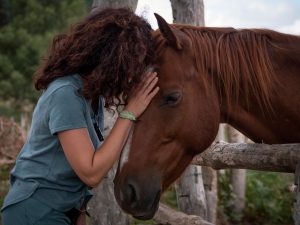Bringing farm youth into mental health conversations
By Tammie Sloup FarmWeek — October 12, 2022
Adolescents and farm owner/operators were recruited this summer for a confidential online survey to help develop resources and programs to reduce farm-related stress, improve resiliency and improve overall physical and mental health among rural families.
While much research has centered on farm stress, studies have predominately focused on adult farmers and agricultural workers.
Children and adolescents, who often have farm responsibilities, have largely been left out of studies and conversation about mental health.
That is starting to change.
Josie Rudolphi, assistant professor and Extension specialist in the Department of Agricultural and Biological Engineering at the University of Illinois and director of the North Central Farm and Ranch Stress Assistance, is part of a research team focusing on how farm stress and mental health is experienced throughout the family.
Prevalence of mental health conditions and even risk for suicide is higher among agricultural populations than the general population.
“But a lot of what we know has focused on adult farmers and agricultural workers,” Rudolphi said during a recent webinar focusing on farm youth mental health and hosted by AgriSafe. “We know that the farm is a business but it’s also a residence. We know there are upwards of 2 million youth who are either living or working on a farm. We know they’re often participating in farm work or present in the farm environment and experiencing some of these stressful realities of agricultural production. But children have been absent from a lot of the research we’ve done around farm stress.”
The Farm Adolescent and Adult Mental Health Study (FAAM) is a project of the National Children’s Center for Rural and Agricultural Safety and Health and the University of Illinois Urbana-Champaign.
Now in year two of the five-year study, adolescents and farm owner/operators were recruited this summer for a confidential online survey to help develop resources and programs to reduce farm-related stress, improve resiliency and improve overall physical and mental health among farm adults and farm adolescents. More than 122 families participated, including 26 from Illinois, and were screened for depression and anxiety symptoms.
In both categories and for both adolescents and adults, at least 60% experienced at least mild symptoms of depression and anxiety — more than the general population, Rudolphi said.
Rudolphi has also worked closely with fellow presenter Jana Davidson, program manager at the Progressive Agriculture Foundation, which is North America’s largest safety and health educational program for children. A couple years ago, the foundation spearheaded a roundtable focusing on farm youth mental health and how to create curriculum addressing the issue.
“We have a vision that no child would become ill, injured or die from farm ranch and rural activities, Davidson said. “We knew that there was a lot of folks coming together and really talking about farm mental health in general, but the children were being left out. So we decided the best way for us to kind of get a pulse on what was happening and really understand how farm families are feeling was to have a roundtable.”
Roundtable participants found specific stressors are common to farm youth:
- Weather
- Family finances
- Long work hours
- Negative interactions with those who have a disconnect with the ag industry
- Pressure to carry on farming tradition
- Inability to participate in extra-curricular activities
“Our focus is for children to understand stress and their emotions,” Davidson said. “And begin to make that connection between mental health and physical health to keep breaking that stigma between the two and that they really do go hand-in-hand.”
When bringing the curriculum into the classroom for agriculture safety days, Davidson said they focus on fun, hands-on activities, such as making stress balls. The foundation also provides take-home bags for students with more reference materials and guides for parents on how to talk to their children about stressors and mental health.
A few small acts can make a big impact, Davidson said, adding she’s read there are nine vital minutes each day for a child: the three minutes after they wake up, three minutes after they get home from school and the three minutes before they go to bed.
“So, remember that when trying to make those memorable for that child,” Davidson said. “Ask them questions, listen — we can all be better listeners — and just make sure we’re present in their lives.”
She also encouraged role modeling when it comes to coping with stress.
“Our children are looking to us as their first teacher to guide them. So, if we practice self-care and encourage them to do the same, they will likely adopt it. If we have coping strategies, when we get stressed out and they see us practicing that whether that’s yoga, journaling, riding a bike … they’ll learn to adopt those practices.”
This story was distributed through a cooperative project between Illinois Farm Bureau and the Illinois Press Association. For more food and farming news, visit FarmWeekNow.com.







